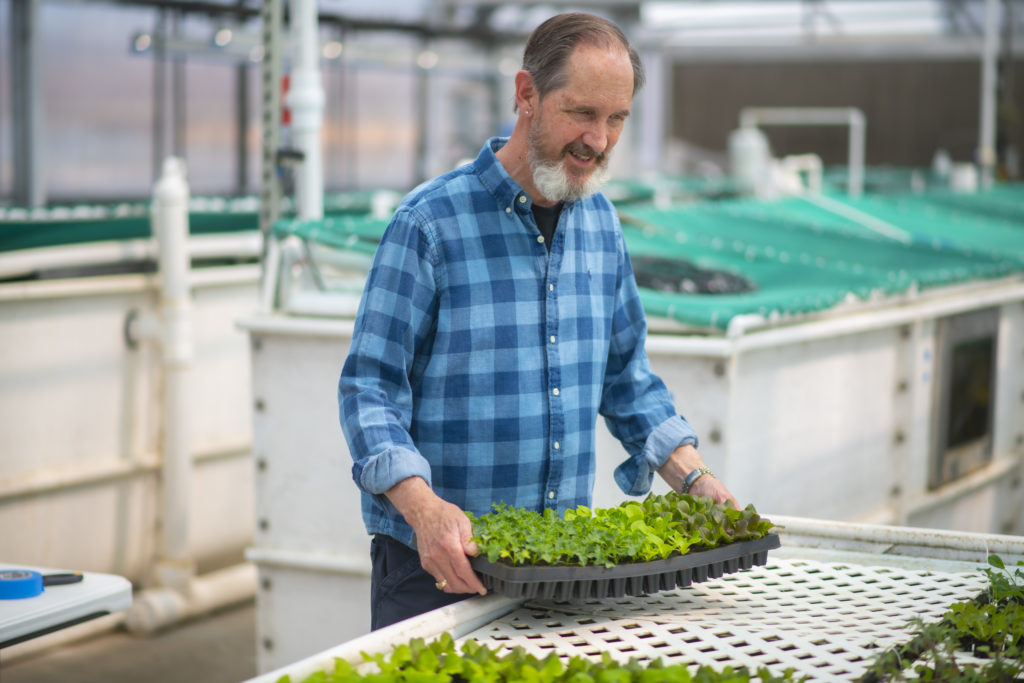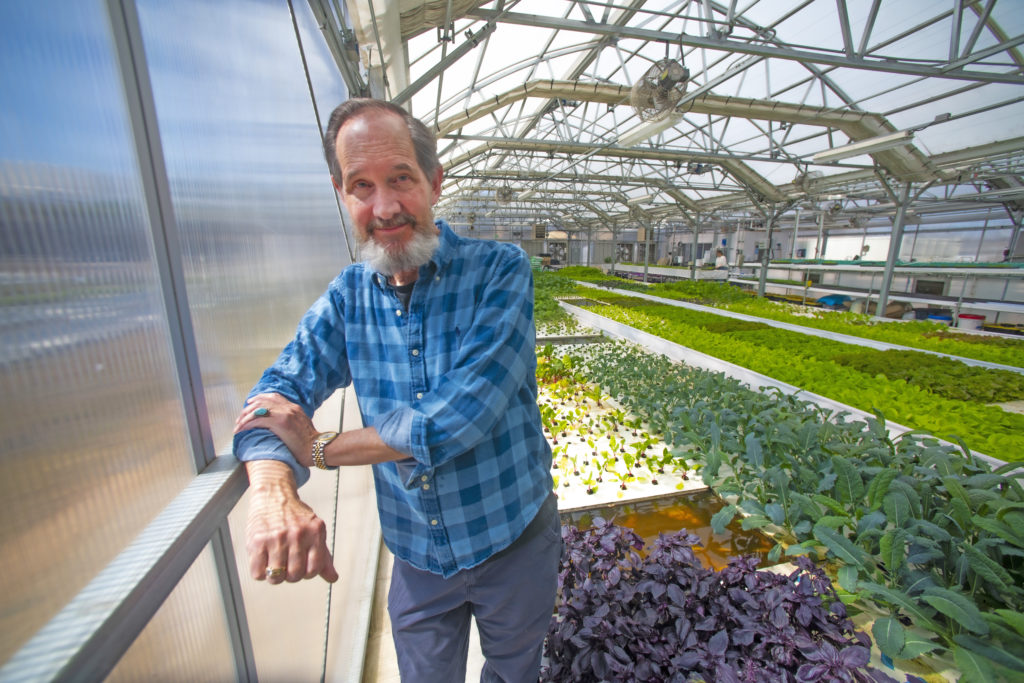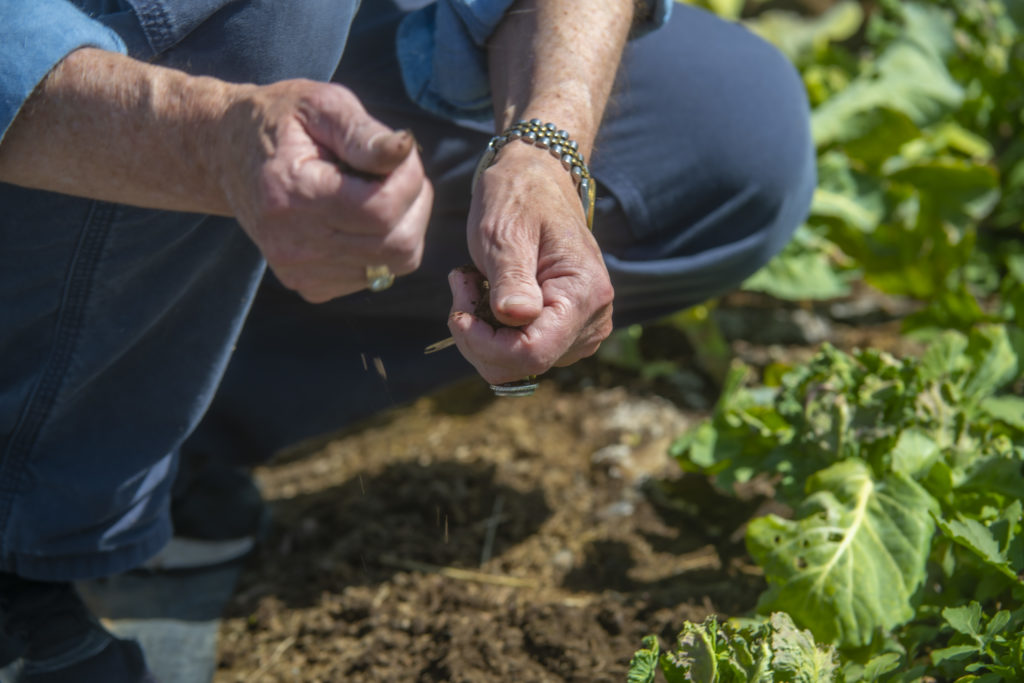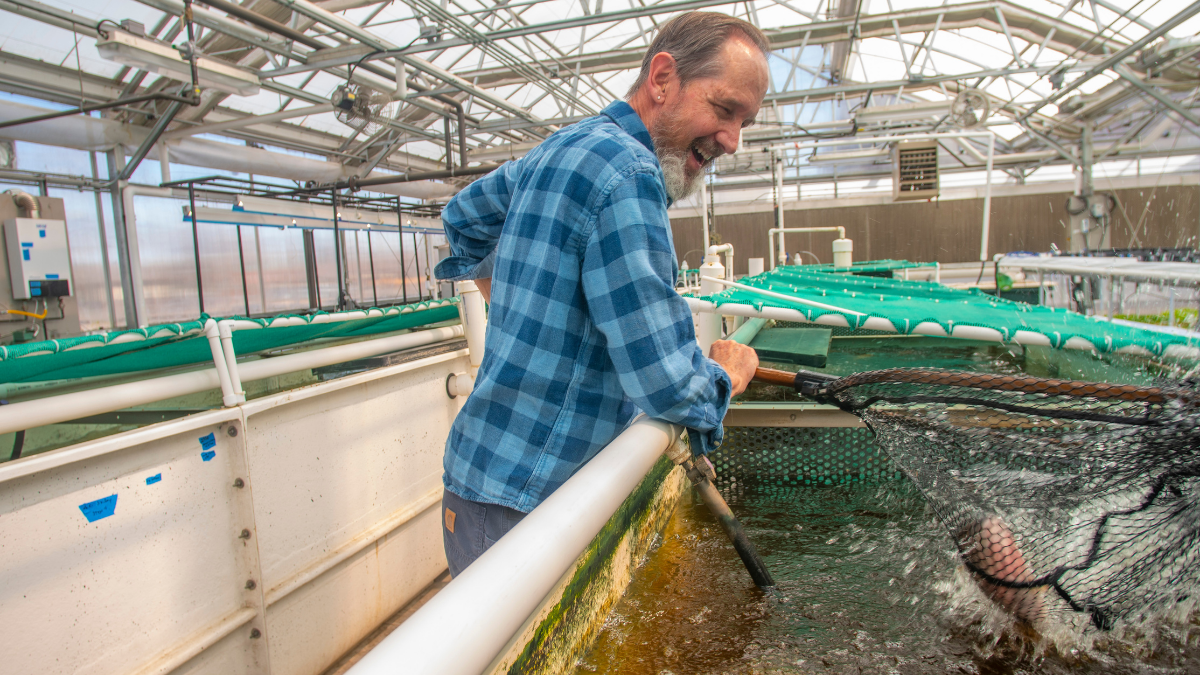Rick is pictured above catching fish at the aquaponic greenhouse at Dahlia Campus – aquaponics produce a fresh healthy protein option while saving water, limiting pesticides and increasing productivity.
Photography by Evan Semón.
View this post in ASL in a new tab, or scroll to the bottom of the page for the video.
From the first moment I met Rick Phillips, it was clear how at-ease he is volunteering on the Dahlia Campus for Health & Well-Being’s Market Farm and Aquaponics Greenhouse. Munching on an apple and prepared with sun hat, water bottle and farm clothes, he seems ready for any task requested of him.
Rick has been volunteering at Dahlia Campus since January 2020, and has shown an unwavering commitment to the land, plants and people providing for the Northeast Park Hill community, even in the face of a global pandemic.
While showing me around the farm and greenhouse, he lists off his duties as a long-time volunteer – everything from cleaning the floating rafts in the greenhouse and catching fish in the water tanks to seemingly-endless weeding on the in-ground farm.
A Day in the Life
Rick typically spends two days a week volunteering at Dahlia Campus – three hours a day in the greenhouse and three hours a day on the farm.
“I love the physical parts of this work because it’s good for my well-being and I know my efforts help this neighborhood,” he says as he grabs a net on a pole and demonstrates how to catch and transfer fish from one tank to another. “It’s rewarding to see the work I do benefit this community. It’s basically the mission of this farm and greenhouse to provide fresh, healthy food for the residents of Northeast Park Hill. I love that my effort impacts that mission.”
Dahlia Campus for Health & Well-Being was designed in collaboration with the residents of Northeast Park Hill to fit the needs of the community. Before the campus opened, the neighborhood was considered a food desert — an area severely lacking in fresh produce. Through these combined efforts, Dahlia Campus’ in-ground farm and aquaponics greenhouse have filled vital gaps in well-being.
After getting splashed by a fish determined to evade the net, Rick leads me to another part of the greenhouse, where plants of varying sizes are nestled on floating styrofoam rafts. Each plant is secure in its own space on the raft, with roots touching the water below. He shows me all sorts of leafy greens in varying stages of growth – from seed trays to kale ready for harvesting.
“One of the things I do in the greenhouse is plant seeds in their germination trays,” he says. “Usually, there are 12 or so trays to fill with all kinds of seeds and plants. I love to go back over there every week to see the trays that I planted and watch the little plants get taller and taller. I love seeing how the plants grow, both inside the greenhouse and on the farm.”
He chuckles and adds, “The weeding gets a little tedious though.”



Learn and Grow
After finishing up our mini tour of the greenhouse, Rick and I take a seat in the shade. We get to talking about how he started volunteering at Dahlia Campus and what inspired him.
“My wife and I are big gardeners, and I’m very interested in the whole urban agriculture scene,” he says. “We have many vegetable beds, and a lot of flower beds. When it comes to volunteering, I was interested primarily in working in the soil, like the farm here, because I wanted to learn what I could from the experts.”
He continues, “I’m a person who’s full of questions, and I appreciate that both the greenhouse team and the market farm team answer my questions. They are all incredibly knowledgeable about urban farming and aquaponics systems. With the greenhouse, I’m amazed by how that whole thing works. They’re growing fish, and the fish waste provides the nutrients for plants. Through the aquaponics system, they’re able to grow thousands of plants that they harvest weekly to supply fresh produce for people in the community. I like knowing the volunteer work I do fosters well-being for the people here – it’s so hard to feel mentally well if you don’t nourish your body, too. Fresh food and community spaces, like Dahlia Campus, make a big difference in helping people have good well-being.”
Volunteering for Well-Being
Much like Dahlia Campus has become a fixture in the Northeast Park Hill landscape, Rick is a staple part of the team of people keeping the greenhouse and farm operating. Throughout our time together, he emphasizes how much joy and peace this work brings him.
“Well-being to me is having my mind at rest, being happy with what I’m doing and not being stressed,” he says. “I like to feel like I’m learning something all the time. I like to be using my body, basically getting some type of exercise, which I do when I volunteer here. When all those things are happening, then I feel good and feel good about myself, because I know I’m helping to forward the mission for WellPower.”
Interested in volunteering with us? Visit mhcd.org/volunteer for a list of open positions and to learn more.


